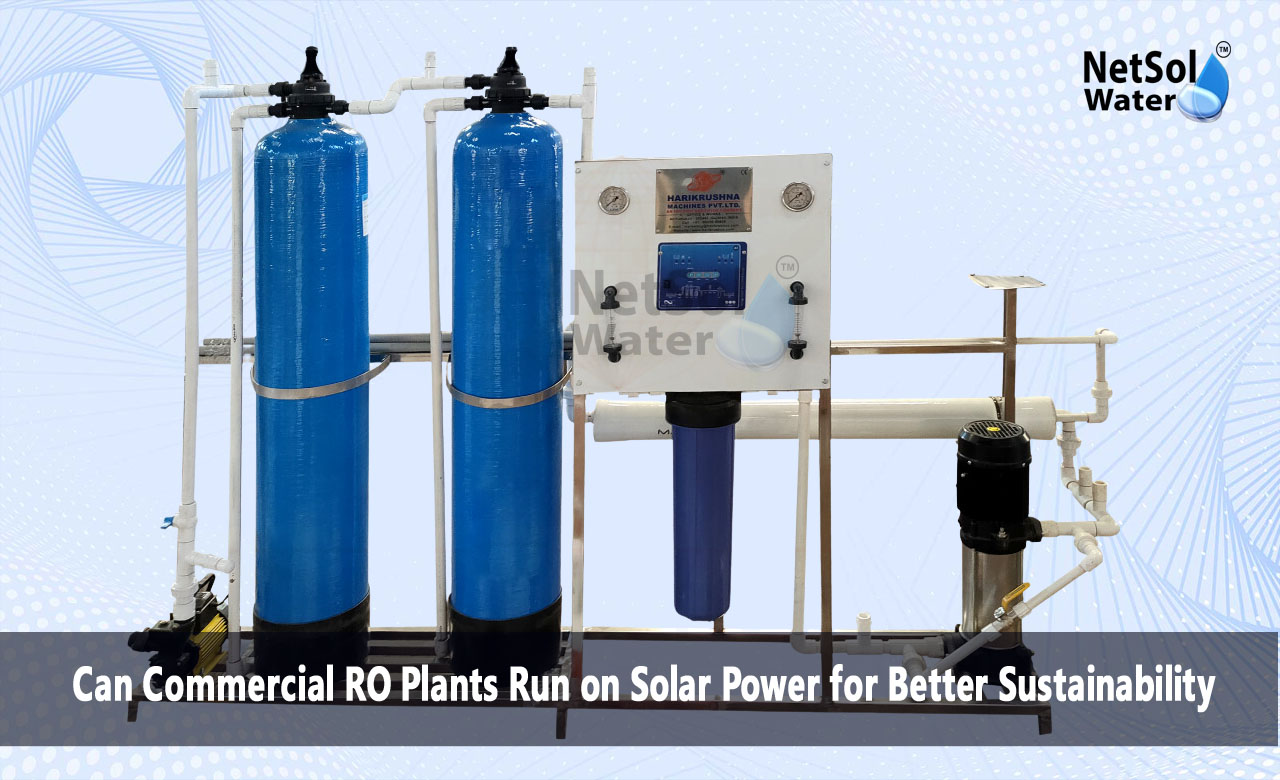Can Commercial RO Plants Run on Solar Power for Better Sustainability?
As environmental issues and the cost of energy escalate, companies are searching for clean ways to minimize carbon emissions. Solar energy as a means of powering essential systems, including RO water treatment facilities, is one solution that is extremely promising. In this aspect, the question running in everyone's mind is whether or not commercial RO plants run on solar power for better sustainability — and the answer is affirmative. Integrating solar power with commercial RO plants is not only possible, but also cost-effective and rapidly becoming the norm.
Let us learn how it does it, the advantages it brings, and what businesses should keep in mind for its implementation.
Why Combine RO Technology and Solar Power?
Reverse osmosis is an extremely efficient method of water purification, particularly for institutional, industrial, school, hotel, and hospital use. RO units usually need electricity to drive high-pressure pumps and control units. Where grid power is expensive or unreliable, solar power is an intelligent and environmentally friendly option.
That's why solar energy drives commercial RO plants for greater sustainability. This setup lowers the cost of operation, boosts energy self-sufficiency, and meets the environment — without sacrificing water quality.
How Solar-Powered RO Works?
Solar-powered RO plants employ photovoltaic (PV) panels to produce electricity. That power is subsequentlyutilized to drive the pumps, control panel, and other electrical equipment of the RO plant.
There are two main ways this works:
On-Grid Solar RO System
In this, the solar energy is used by the RO plant during the day and grid as an auxiliary source in the evening or during cloudy weather. The surplus energy may be fed back to the grid for extra savings.
Off-Grid Solar RO System
In this, the solar energy in the form of batteries is used by the RO plant only. This configuration suits remote area locations that are not grid connected.
In both situations, commercial RO plants run on solar power for better sustainability through minimizing fossil fuel reliance and encouraging the utilization of renewable energy.
Advantages of Solar-Powered Commercial RO Plants
· Cost Savings on Energy: Solar power is unlimited once installed. This significantly minimizes electricity expenses, particularly for companies that use RO systems around the clock.
· Eco-Friendly Operation: Switching to solar power reduces greenhouse gas emissions, allowing industries to achieve their sustainability goals.
· Reliable Power in Off-Grid Regions: In regions prone to power failure or poor grid supply, solar-powered RO systems provide a reliable water purification process.
· Reduced Operating Costs: Maintenance-free solar systems conserve money in the long run.
· Enhanced Brand Reputation: Ethical business is greatly welcomed by customers, investors, and regulators. Solar RO utilizationindicates a commitment to ethical business.
These advantages make a strong argument for commercial RO plants to utilize solar power for greater sustainability in most commercial businesses.
Optimal Applications of Solar RO Integration
Commercial solar-powered RO plants are of special value to:
· Remote schools and hospitals
· Hotels and resorts with limited access
· Industrial businesses with big roof tops to be used for panel fitment
· Disaster-affected water supply
· Green organizations seeking green accreditation
In such cases, commercial RO plants run on solar power for better sustainability with pure water at minimal environmental effect.
Principal Points to Keep in Mind Before Installation
Though solar RO plants have numerous advantages, there must be planning. Following are some of the points to keep in mind:
· Solar Panel Capacity: Should be equal to the daily power required by the RO system.
· Space Availability: Sufficient roof or ground space must be available for the installation of PV panels.
· Battery Storage (for off-grid systems): Enables extended operation at night time or limited sun exposure.
· System Integration: The RO plant equipment and solar power supply should have coordination performed properly.
· Initial Investment: While solar installation is an initial investment, cost savings in the long run make it worthwhile.
Expert advice will ensure that your system is properly set up to suit your water usage requirement and availability of sunlight in your location.
Sustainability Objectives and Future Prospects
As the planet is shifting towards cleaner energy sources, solar RO plants fit global Sustainable Development Goals (SDGs) best of all, particularly clean water. SDG 6 and cheap clean energy. SDG 7. Governments also promote green technology through subsidies and incentives.
This increasing popularity strengthens the case that commercial RO plants are run using solar power for enhanced sustainability, presenting an example for other businesses to emulate in minimizing environmental impact without compromising efficiency.
Conclusion
The commercial RO plants run on solar power for better sustainability. Not only does the installation save electricity costs but also toward a cleaner, greener future. If you own a factory, a hotel, a hospital, or an office, energizing your RO plant with solar energy is a wise move toward water purification that is efficient and green.
Since more and more industries shift towards green alternatives, solar-powered RO plants will become the new norm in clean water technology.
Do you need an advice or assistance on selecting the best water and waste water treatment unit? We have solutions for all your problems!
Let us know your problem, our experts will make sure that it goes away.
For an assistance or related query,
Call on +91-9650608473 Or write us at enquiry@netsolwater.com



